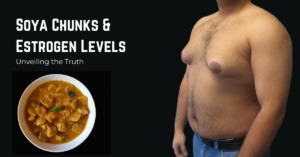Last updated on June 10th, 2024 at 01:01 pm

Soya chunks have gained immense popularity as a protein-rich alternative to meat products, especially among vegetarians and health-conscious individuals. However, myths and misconceptions often surround soy consumption, particularly regarding its potential impact on hormone levels, especially in men. In this article, we explore the question: Does consuming soya chunks daily increase estrogen in men? Let’s separate fact from fiction and explore the science behind it.
Understanding Soy and Estrogen
Soybeans contain compounds called isoflavones, which are classified as phytoestrogens—plant-based compounds that are similar in structure to estrogen. The two main isoflavones found in soybeans are genistein and daidzein. These compounds can interact with estrogen receptors in the body, but they are much weaker than human estrogen. This interaction has led to concerns about soy’s potential effects on hormone balance, particularly in men.
The Role of Estrogen in Men
Estrogen is often associated with female reproductive health, but it also plays essential roles in men’s bodies. Men naturally produce small amounts of estrogen, which is crucial for functions such as bone health, sexual function, and mood regulation. For example, estrogen helps regulate bone density, contributing to overall skeletal health.
Additionally, it helps with sex drive and the ability to have erections. Moreover, estrogen affects feelings and how well you think, with imbalances possibly causing mood swings or changes in how you think. However, having too much or too little estrogen can cause health issues. So, while estrogen is important for different body functions in men, keeping the right amount is important for overall health and feeling good.
Examining the Evidence
Many studies have looked at how eating soy affects estrogen levels in men. Despite what most people think, most of these studies have found that eating a moderate amount of soy doesn’t really change estrogen levels in men.
For example, a study in the Journal of Nutrition discovered that eating up to 50 milligrams of isoflavones daily, which is about 2-3 servings of soy foods, didn’t change testosterone levels in men. Actually, some studies show that eating soy might even be good for certain health issues, like lowering the chance of heart disease and prostate cancer.
Moderation is Key
While moderate consumption of soya chunks is generally considered safe for most men, it’s essential to emphasize the importance of moderation. Excessive consumption of soy products may lead to an intake of isoflavones that could potentially affect hormone levels. However, such effects are typically observed only with very high levels of soy intake, well above what is typically consumed in a balanced diet.
For instance, sticking to a maximum intake of 25 to 30 grams of soya chunks per day is recommended to avoid potential adverse effects on hormone balance. By enjoying soya chunks in moderation, individuals can harness their nutritional benefits without worrying about negative impacts on estrogen levels.
Conclusion
Eating soya chunks every day probably won’t make a big difference in raising estrogen levels for men if you eat them in reasonable amounts. Even though soy has phytoestrogens, studies show they don’t really mess with men’s hormone levels. Like with any food, it’s important to have a balanced diet with different kinds of foods, and pick good-quality soy products from brands you trust. By knowing what you’re eating and having soya chunks as part of a balanced diet, you can get their good stuff without stressing about messing up your hormones.
FAQs
Can soy consumption lead to feminization or hormonal imbalances in men?
There is no substantial evidence to support the idea that moderate soy consumption leads to feminization or hormonal imbalances in men. Studies have shown that phytoestrogens in soy have minimal effects on hormone levels and are unlikely to cause adverse effects on masculinity or overall health.
What is the recommended daily intake of soya chunks for men?
It is generally recommended to consume soya chunks in moderation, with a suggested daily intake of around 25 to 30 grams per day. This amount allows individuals to enjoy the nutritional benefits of soy while minimizing the risk of excessive phytoestrogen intake.
Are there any health benefits associated with consuming soy products like soya chunks?
Yes, soy products offer numerous health benefits, including being a rich source of plant-based protein, fiber, vitamins, and minerals. Regular consumption of soy has been linked to reduced risk of heart disease, improved bone health, and potential protection against certain types of cancer, such as prostate cancer.
Are there any concerns or precautions associated with soy consumption?
While soy is generally considered safe for most people, individuals with specific health conditions or concerns should consult with a healthcare professional before significantly increasing their soy intake. Some people may have allergies or intolerances to soy, and excessive consumption of soy products may lead to gastrointestinal discomfort in some individuals. Additionally, individuals with thyroid disorders or estrogen-sensitive conditions may need to monitor their soy intake, although moderate consumption is unlikely to pose a significant risk.